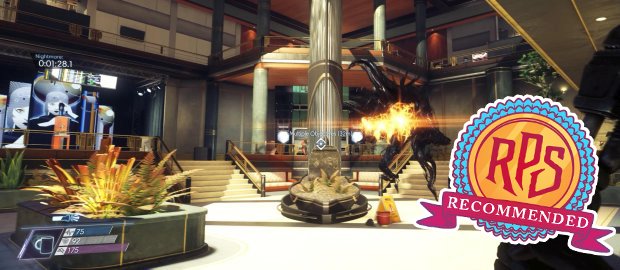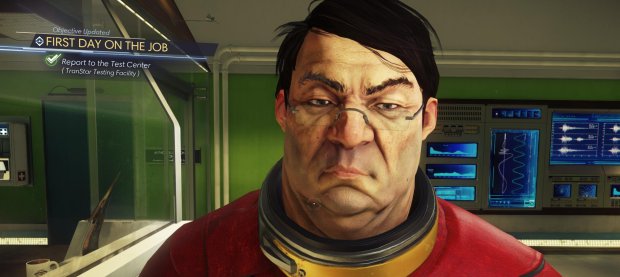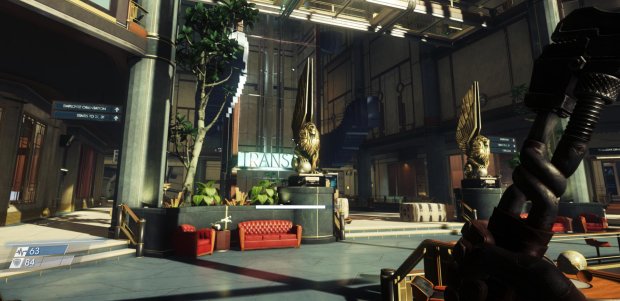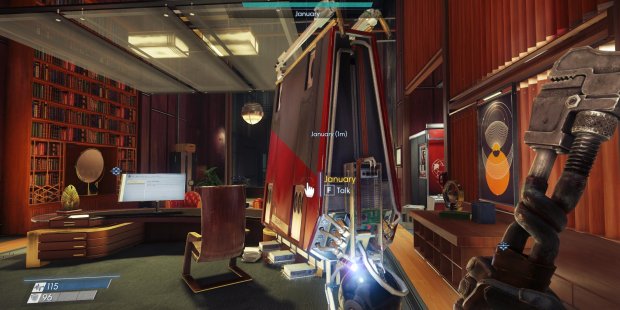Wot I Think: Prey
John Walker on May 9th, 2017 at 11:30 am.
Prey [
official site] is, I’m so pleased to report, a truly fantastic game. It is also a game for which, delightfully, you’re going to have to shake off a lot of habits and assumptions. Here’s wot I think:
The first thing to forget is the original Prey. This has flat-out nothing to do with it. It is, frankly, ridiculous that it has the same name. This isn’t a sequel, nor a remake, nor a sister-game. It’s utterly unrelated. This is a game in which you play either a female or male Morgan Yu, a research scientist on a space base, which has been infested with a shape-shifting black-goo alien evil. There are no hokey tribal powers, instead an ever-growing pile of hokey scifi powers. And you’ll be shooting far less often than you could have expected.
The next thing to forget is the small matter of how you’ve played games for the last decade or so. Prey is unquestionably built out of the bricks of a dozen other classic games (think System Shock, BioShock, Deus Ex, Metroid Prime), but it’s put them together in a unique pattern that, for the first half at least, kept surprising me.
Having deliberately avoided reading previews and watching footage, I was first and most surprised to learn Prey doesn’t take place in a corridor. However, it took me literally hours to start believing that it really was as open and freeform as it undeniably is. Despite always feeling like a first-person action game, it offers a far more RPG-like collection of ongoing quests to complete, and despite the seeming restriction of taking place in just one location, it’s a massively broad and unfolding setting in which you have a remarkable level of freedom to explore where you wish.
Here the Metroidvania kicks in, with the game often blocking progress in one area of one section by something you realise you’re not yet equipped to handle. But dig in a little deeper and you might find extra exploring and improvisation allows you early access anyway. Which all leads toward the overarching tone of Stumbling Upon.
Prey makes big progressive steps forward by giving you new equipment or abilities. You’ll know this, because it’s impossible to have avoided that at some point in the game you’re going to be able to turn into a coffee mug. What’s incredible is the nonchalance with which this ability is eventually introduced. It’s a fair way in, how far entirely dependent upon how much you focus on the main quest beats and how good you are at not being distracted by intriguing-looking side routes and side-quests. And when you find it, it’s not some grand gesture or achingly scripted sequence – it just is. You just have that now. The real question is whether you want it.
The same is true of so much else. I’ve gained super-important new skills that change how I approach the game while thinking I was just off investigating an interesting tunnel off the main path. “Oh, what’s in this box? Oh, a thing that means I can now scan and track enemies. Cool.”
I’ve never seen a game be this relaxed about itself, and it’s a huge joy. Everything from every major publisher seems so obsessed with enforced fanfares, choreographed sequences and non-interactive cutscenes, to make sure you notice all their hard, hard work. Prey seems completely ambivalent about this, just content with being a brilliant game and letting you notice that for yourself. It’s bloody weird to experience.
You next need to forget expectations developed by the recent Deus Ex games. As pleasant as they are, they were unquestionably a compromise between Looking Glass’s format and a more modern linear shooter. It’s only natural to assume Prey would have adopted the same compromises. It was not something I could have predicted that it would not only ignore all that, but not even shape itself like a Looking Glass game. Instead the faux-claustrophobic nature of a space station belies an ever-expanding space in which you become ever-more competent to survive.
That latter part is perhaps the game’s first misstep, too. Combat, at the start, is bloody awful. Avoidable in the most part, but still awful. Mimics are the critters of Prey, spidery beasts that can take on the shape of any small object, and then sproing into their gooey black skittering form with a big orchestral blast. That’s a brill idea, but unfortunately in execution they’re deeply tedious. Their attacks are very close-up, which is not useful in a first-person game, and your only weapon at the start is a wrench. Mimics move so fast, and get so in your face, that you end up waving it around like an idiot – something made even more annoying by there being the most ridiculous stamina bar for such an action. I’m a massive wimp, but I can still wave a spanner around without needing a sit down after fifteen seconds. Not so Morgan.
You’ll likely soon get a pistol, but again at the start it’s really ineffective, the wrench infuriatingly the better tool. And after a while of this, it can start to feel a little overwhelming. Prey is a difficult game from start to finish, but much more so at the start. And looking back, I’m grateful for it. It forces you into a different style of play, one where running around spraying bullets isn’t only impossible (there just aren’t enough bullets), but also far less effective than using more intelligent approaches. By the time I felt confident enough with my skills and weapons to be able to survive a firefight, I was still far more likely to devote my efforts to arranging turrets, setting traps, and whipping out a shotgun as a last resort.
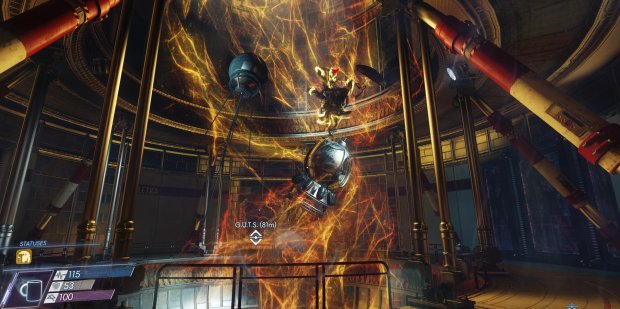
Morgan Wu, whether male or female, is a half-German, half-Chinese senior member of the Talos 1 team, a group of researchers, scientists and space pioneers living on a space station orbiting the moon. After the failed assassination attempt of JFK, the US space programme made huge leaps, spurred on by USSR competition. By 2034, Talos 1 is a thriving luxurious space station, hindered only by the attentions of a malevolent alien species called the Typhon. And beyond that, because of the really splendid way Prey environmentally and anecdotally tells its story, I won’t say anymore. However,
how it tells this story deserves more celebration.
Notes, diaries, emails and books are hardly a fresh nor original way to give a player background information to a place and build up to a major incident, but then as I’ve said, Prey is not a game that stretches for original features – rather building something original out of their parts. But this is a masterclass in how it should be done, easily comparable with the original Deus Ex for the gentle, unfussy subtlety with which you can build up an understanding of what’s happening. Hacking terminals, reading emails, grabbing post-it notes, watching video files, listening to audio logs, are almost all optional. Each elaborates on Talos 1’s tale letting you piece together the station’s long history, origins, and recent catastrophes. And there’s practical application too – throughout the game there are choices to be made, and joyfully they’re not BELLOWED MOMENTS, but rather calm decisions – the more background you know, the more informed or influenced your decisions can be.
You’re further influenced by various voices. There’s a floaty robot called January, who is essentially Morgan’s self-programmed Jiminy Cricket, countered by the opposing voice of Morgan’s brother, Alex. Each has different arguments for what you should be doing about Talos 1’s rather severe predicament of black gooey alien evil, and while there’s definitely a “good” and “bad” spin, both are decent arguments. And complicated, too, further influenced by other information you’ll gain, and secrets to uncover.
Which is all bloody marvellous, until the end. Oh good
grief. Prey’s ending is utterly, utterly terrible. I clearly shan’t even start to hint at spoiling it, but it’s atrocious, no matter which of a few barely varying finales you see. It’s abrupt, crass, and genuinely embarrassing, and even worse, madly dismissive. Literally a five second cutscene, before a post credits sequence that will have you wanting to write to your local politician to complain. (And the credits, about ten minutes long, are unskippable. I
strongly recommend finding ‘steamapps\common\Prey\GameSDK\Videos’ and changing ‘Credits.bk2’ to ‘Credits.bk2.bak’, until they patch in the option to flipping skip seeing who made the best tea at the Australian offices of Bethesda.)
A bad ending doesn’t spoil a fantastic game, and Prey is absolutely that. But it really does change your overarching feelings when you’re trying to sum it up. Especially when it leaves so many threads dangling. It’s a real shame, and I expect we’ll eventually learn horror stories about the game being rushed out without anything close to the ending they were hoping for. But I don’t want to let that fill more than two paragraphs of this review, because it’s such a minor part of the dozens of hours of entertainment preceding it.
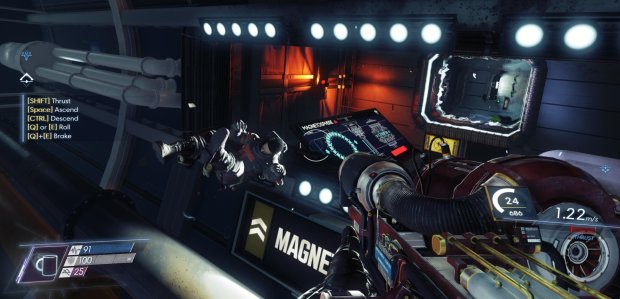
A game as strong, and as gripping as Prey, means errors that normally cause one’s teeth to grind are more easily forgiven. So when I saw a floating corpse I thought, “Oh, that’s odd,” rather than, “BAH! This game!” But it’s worth noting there are a few such issues, and none more annoying than how bad it is at letting you balance on thin beams when climbing. It encourages climbing, lots of fun secrets are hidden in the ceilings, and alternate routes around locked doors can be found if you look up more. So it’s infuriating there wasn’t more effort to ensure scrambling about felt more finished, less constantly slippy.
Plus, amongst its many splendid quests are a lot of duds, withering rather than ending. And if I’m to list my complaints, let me add in that the map is terribad. However, when I think about that, about how poorly it shows you where parts of the station are in relation to each other, and especially where stairs link floors, it makes me remember to celebrate how every other interface is great.
We’ve had a spate of decent games spoiled by abysmal UIs, and that’s not the case here. There’s inventory Tetris, but it’s done very well with a super auto-sort. Weapon upgrades are clear and simple. New abilities and skills are simply explained and easily implemented. Quests are clear, no problem to keep track of. (One tip: don’t forget there are two further barely noticeable tabs in your Inventory for augmenting your suit and scope – I entirely forgot this for an embarrassing amount of the game.)
Combat definitely improves, but the Mimics never get less annoying. It’s definitely the game’s weakest aspect, but that’s surprisingly unimportant overall. The game is far more about its place, your role in that place, and improvising within it. Fighting off Mimics and the even worse Cystoids, is only ever irritating. But larger Typhons with ranged attacks let you use your own methods, from a large pool. BioShock is definitely an influence here, with the option to just run right past nearly always there too.
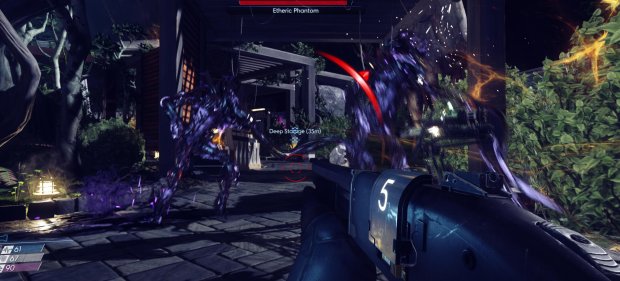
Prey is brilliant, and it’s still great right up until moments before its end. Although it’s gently less brilliant as it goes on. It’s really hard to write this sentiment without it sounding more negative than it should be, but it’s essential for capturing the nature of the game. Visual demonstration: I’m holding my hand high above my head – the game starts here. Now my hand’s just above my head – and finishes here. The further you go, the less special its nature starts to feel, the more normal (where “normal” is classic games with which we’re familiar) it becomes. At the start it’s this sprawling, messy, Metroidy exploration, scrappily surviving against increasingly large and powerful enemies. By the later stages, when you’ve opened up most of the station, it’s much more about slogging from one place to the next in order to have some more targeted fun. Combat remains tricky, and my technique of daftly lugging two turrets (only able to hold one at a time) with me into big fights stood me until the end, even when I was replete with super-abilities – but it’s still easier to survive. At a certain point you’re checking off quests from the list before it ends, and things start to feel like a great but familiar game, rather than a really great and surprising game.
I’m so delighted to have had those first dozen hours. It’s so, so long since a big budget game has felt so fresh, so inspired, so imaginative with the building blocks of Looking Glass’s legacy. And I’m very pleased to have had the rest (but for the final five minutes), possibly about 30 hours or so in total.
Prey is a game that’s smart about almost every aspect of itself, and yet with that, so crucially modest. It doesn’t yank the camera from you, doesn’t force you to sit through cutscenes, doesn’t demand you sit still and listen to its backstory. It’s content to be itself and let you find it, which is a damned rare treat in this hobby. Even more amazingly, for all its array of abilities and powers, you can finish the game without touching them, perhaps even find a narrative rationale for doing so. It lets you improvise, explore, make big decisions without needing to tell you they’re big. And yes, it absolutely does let you turn into a cup.
Prey is out now for Windows for £40/$60/€60 via Steam.









